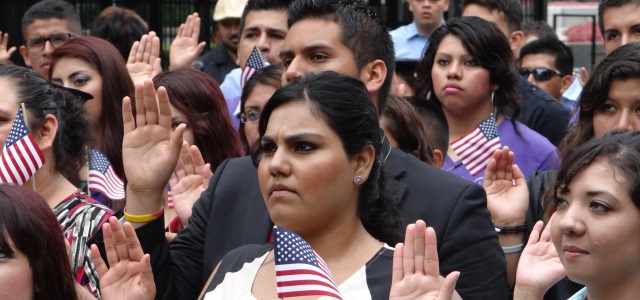 Each year on September 17, the United States observes Constitution Day and Citizenship Day, a combined event that commemorates the anniversary of the nation’s constitution and recognizes all those who are or have become U.S. citizens. It is considered a time for Americans to reflect on the importance of the rights and responsibilities of citizenship, as well as what it means to be a U.S. citizen. However, it’s also an important time to applaud those who have worked hard to become citizens, while exploring ways to remove barriers for those who are eligible, but still haven’t taken the leap.
Each year on September 17, the United States observes Constitution Day and Citizenship Day, a combined event that commemorates the anniversary of the nation’s constitution and recognizes all those who are or have become U.S. citizens. It is considered a time for Americans to reflect on the importance of the rights and responsibilities of citizenship, as well as what it means to be a U.S. citizen. However, it’s also an important time to applaud those who have worked hard to become citizens, while exploring ways to remove barriers for those who are eligible, but still haven’t taken the leap.
For the most part, immigrants are individuals who made the choice to journey to the U.S. Many of them undertook huge sacrifices and enormous risks (including their own lives) in order to come and be part of the United States. So in essence, the foreign born who have made it here have demonstrated a commitment to being part of America. Those who have naturalized were able to match their personal identity and desire to be part of the community with legal recognition from the country they chose. Becoming a citizen is not simply a matter of obtaining new rights (such as voting and serving jury duty); citizenship also encompasses formal recognition of the right to belong, to be part of the community, and to be (at least in principle) recognized as equal to every other member of the state. Clearly the 763,881 new citizens who became naturalized in 2012 recognize this. These individuals are Americans by choice, not by birth.
However, there remain millions more who are eligible, but as of yet (due to language, financial and other barriers) have not yet gone through the process. Innovative programs have been developed to respond to the perceived barriers, for example Citizenship Work’s recently launched an app for Smart Phones that helps individuals navigate the process of becoming a citizen—which many call a bureaucratic maze. In addition, fee structures should be set that respond to analyses of how required fees impact naturalization rates and sufficient English classes must be available in order to enable aspiring citizens to pass the required English-proficiency exam.
Recent immigration reform efforts have called for a path to citizenship, arguing that it is unacceptable in the 21st century to keep millions of members of U.S. society from even dreaming about the possibility of becoming U.S. citizens one day. For these immigrants, securing a pathway toward U.S. citizenship would be a tremendous step forward in their lives; however, in addition to providing a path, we must ensure the proper policies and supports are in place to enable them to get there.
FILED UNDER: citizenship, Integration, naturalization, pathway to citizenship, undocumented immigration


